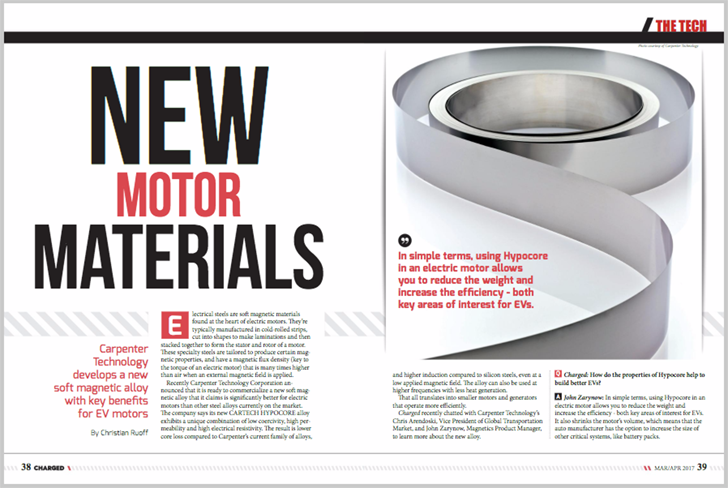Electrical steels are soft magnetic materials found at the heart of electric motors. They’re typically manufactured in cold-rolled strips, cut into shapes to make laminations and then stacked together to form the stator and rotor of a motor. These specialty steels are tailored to produce certain magnetic properties, and have a magnetic flux density (key to the torque of an electric motor) that is many times higher than air when an external magnetic field is applied.
Recently Carpenter Technology Corporation announced that it is ready to commercialize a new soft magnetic alloy that it claims is significantly better for electric motors than other steel alloys currently on the market. The company says its new CARTECH HYPOCORE alloy exhibits a unique combination of low coercivity, high permeability and high electrical resistivity. The result is lower core loss compared to Carpenter’s current family of alloys, and higher induction compared to silicon steels, even at a low applied magnetic field. The alloy can also be used at higher frequencies with less heat generation.
That all translates into smaller motors and generators that operate more efficiently.
Charged recently chatted with Carpenter Technology’s Chris Arendoski, Vice President of Global Transportation Market, and John Zarynow, Magnetics Product Manager, to learn more about the new alloy.
Charged: How do the properties of Hypocore help to build better EVs?
John Zarynow: In simple terms, using Hypocore in an electric motor allows you to reduce the weight and increase the efficiency – both key areas of interest for EVs. It also shrinks the motor’s volume, which means that the auto manufacturer has the option to increase the size of other critical systems, like battery packs.
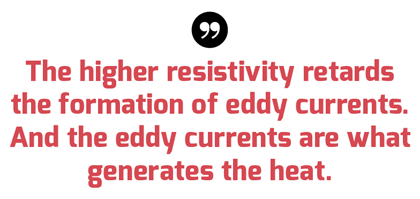

This is achieved by reducing a motor’s core loss, which contributes to heat buildup and reduces the energy efficiency of the system.
Essentially, Hypocore’s new patented chemistry formulation increases the alloy’s resistivity. The higher resistivity retards the formation of eddy currents. And the eddy currents are what generate the heat. So, increasing the alloy resistivity manifests itself as a core loss reduction.
The other potential benefit, although it’s tougher to quantify at this stage, is that reducing the core loss and operating temperature should, in theory, increase the life and reliability of a motor. Because the number-one cause of motor failure is heat buildup.
Chris Arendoski: Overall, our early studies indicated that the reduction in weight is approaching 30% when using Hypocore in place of the current standard magnetic steels. I would say that is the big selling point of the Hypocore material. That is a substantial advantage when you’re talking about transportation applications like long-range EVs.
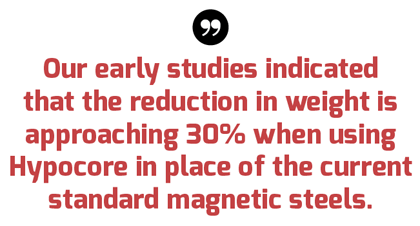

Charged: Was there some fundamental breakthrough that allowed you to develop the Hypocore alloy, or is it more of a natural iteration of your normal R&D work?
John Zarynow: There were fundamental breakthroughs, and they were deliberate. The breakthroughs came in the areas of the underlying chemistry and manufacturing processes, which, unfortunately, are proprietary trade secrets, so we can’t talk too much about the details.
We sat down five years ago to analyze our core competency from an engineering and R&D perspective, and ideas surfaced on how we could make a next-generation alloy. We also got input from a lot of our leading customers about what this alloy should be able to do. We were very methodical.
The fact that no one else has a product like this on the market shows you that it takes quite a bit of effort and R&D to develop.
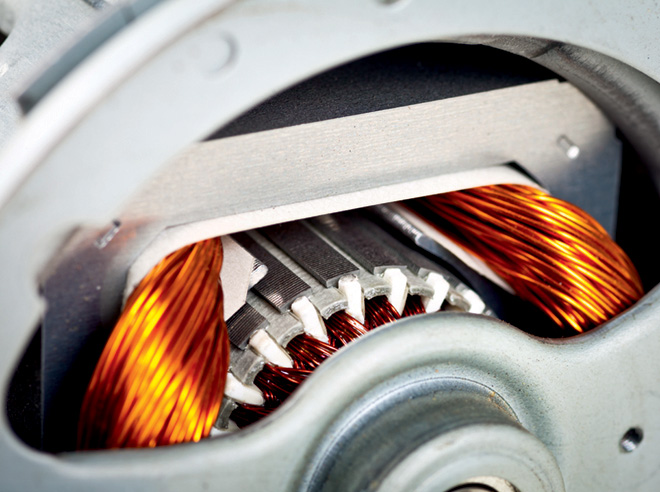

Chris Arendoski: Carpenter has been around for 127 years, and we’re truly an innovator, with a very strong R&D base. We’re a fully integrated mill, which is different from a lot of other steel producers. We will develop the fundamental chemistry and manufacturing technology around an alloy. In a nutshell, our core competency is the optimization of magnetic and other properties through material processing.
Charged: What stage of the development process are you in with the automakers?
Chris Arendoski: We’re in the sampling stages with a few select global OEMs. We’re going through that process right now and getting feedback from them and it’s very positive. However, it’s going to take a while to sort out the full vehicle capabilities and performance of the material. The testing and validation process in the auto industry is quite exhaustive.
Carpenter already has a substantial global automotive segment with a lot of content in IC engines, so we’re familiar with the processes. We produce materials for things like intake and exhaust valves, injectors, pistons, skirt rings, special barriers, powder metal coatings for pistons, etc. We work with a lot of different partners, including several major Tier 1 suppliers.
At this moment we’re developing Hypocore with three major automakers, and they were eager to analyze and test the material as soon as we publicly launched it.
John Zarynow: We think EVs are a great market for Hypocore because it can definitely help to build more low-cost and long-range EVs, which is the goal of many of these OEMs.
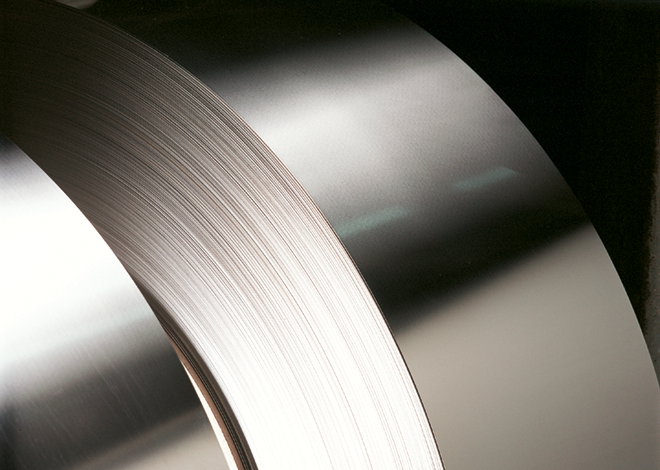

Charged: How does the cost of the Hypocore alloy compare to the electrical steels that automakers are currently using in traction motors?
Chris Arendoski: The value is seen at the OEM level, because you can’t get a new material through their initial approval process without having the cost structure evaluated. I would say that the cost is competitive in the marketplace to provide an engineered solution that the light-duty market is looking for.
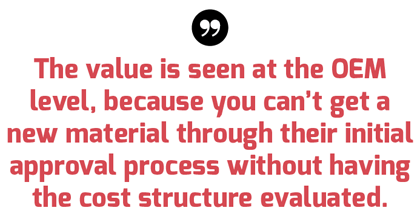

Charged: Other than EVs, what industries do you think Hypocore will thrive in?
John Zarynow: Hypocore’s properties can help solve problems in a lot of different industries. Drones, both military and consumer, traction transformers like those in electric trains, speakers, wireless charging – which is growing quickly. It can help make smaller light medical devices – like a portable dialysis machine for example.
Also, when you feel your laptop or phone getting hot, part of that is related to the core loss of the charging electronics. So, when you have a material that has lower core loss, in theory, depending on the design of the device, you should be able to mitigate or reduce the amount of temperature rise.
Chris Arendoski: Carpenter participates in all these market segments already. We have advanced materials going into the medical industry, and partner directly with a lot of consumer electronics companies on next-gen material development. So, we have seen a lot of demand and interest from all types of customers.
Charged: Is Hypocore a standard off-the-shelf product, or is it something you will customize for a customer’s specifications?
John Zarynow: We do work with our customers to customize alloys to obtain the optimal magnetic properties for an application. We also routinely provide a thickness or gauge that the rest of the industry won’t, along with a width and a configuration. If you want a bar, strip, or a coil, we customize routinely.
Optimized magnetic properties is more of a developmental project, but we have done that in the past and continue to do that today.
Chris Arendoski: We are a specialty solutions provider, so we do have a base group of alloys in the Hypocore family, and we can deliver it in multiple product forms and packaging sizes. As needs evolve, and as large OEMs and other players look at this technology, we can make changes to the chemistry in order to fine-tune or tweak something for them.
Charged: What are the other product lines that Carpenter developed for the auto industry?
John Zarynow: Our two main families of product for automotive are CARTECH CHROME CORE and CARTECH HIPERCO alloys.
Our Chrome Core family of alloys has been used in fuel injector solenoid applications in automobiles for many years. They offer superior corrosion resistance over other competing solenoid-grade steels on the market, and can be used in PHEV and hybrid vehicles. With fuel injector solenoids, the alcohol and the gasoline can corrode the solenoids if the alloy that’s being used is not specified correctly. So, it’s a magnetic alloy but it offers superior corrosion resistive properties.
Our Hiperco family are iron-cobalt alloys. They offer very high magnetic saturation, which means that more force can be generated using less volume and mass of material. It has applications in other many segments, but it’s predominantly used in aerospace. If you have a tight space constraint, like on an airplane, and you need a motor to be a certain weight with a certain power output, that’s where this alloy has great application. The benefit to the auto industry is that this alloy family can enable the design of smaller traction and auxiliary motors (AC compressor, fuel pump, alternator, etc.). So Hiperco is currently used commercially, and it’s the predecessor to the new Hypocore alloy.
This article originally appeared in Charged Issue 30 – March/April 2017 – Subscribe now.




